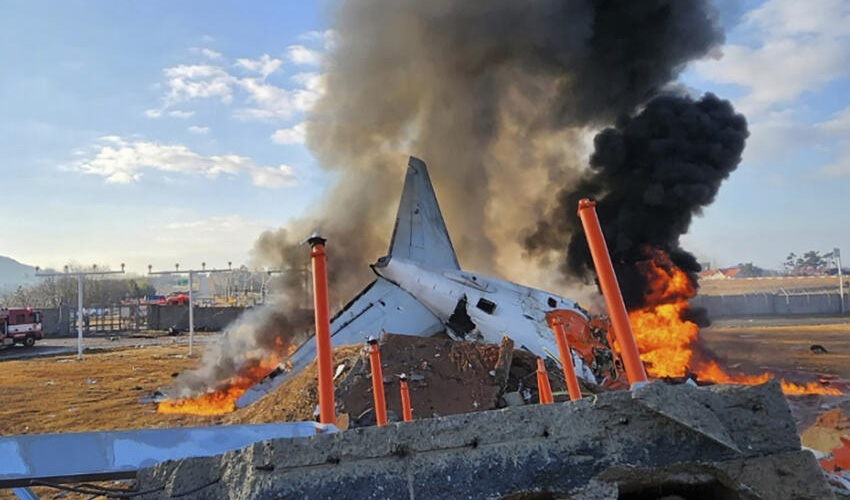179 confirmed dead in South Korea’s worst plane crash
Media reports reveal plane skidded down the runway without its landing gear deployed

The Jeju Air flight 7C2216, a Boeing 737-800, arrived from Bangkok with 175 passengers and six crew members on board when it failed to land safely.
The tragedy unfolded just after 9 a.m. local time (0000 GMT), as the aircraft attempted to land at the small airport in the country’s south.
Eyewitnesses and media reports revealed that the plane skidded down the runway without its landing gear deployed, crashing into navigation equipment and a wall, erupting into a massive fireball.
The flames and debris left little of the plane recognizable, with only the tail section remaining intact.
According to Muan’s fire chief Lee Jung-hyun, the two crew members who survived were rescued from the tail section of the aircraft and were rushed to nearby hospitals with severe injuries.
South Korea’s transport ministry confirmed that the crash was the deadliest air accident on South Korean soil, surpassing the 1997 Korean Air crash in Guam that killed over 200 people.
Possible causes under investigation
Initial investigations are focusing on the possibility of a bird strike, which may have caused a malfunction in the plane’s landing gear. Authorities noted that a bird strike warning had been issued by the control tower just moments before the pilots declared a mayday.
Gregory Alegi, an aviation expert, questioned the circumstances surrounding the crash, pointing out anomalies such as the plane’s high speed and the failure of the landing gear and flaps. “There are more questions than answers at this point,” Alegi said, calling the incident highly unusual.
The investigation will be led by South Korea’s aviation authority, with assistance from the U.S. National Transportation Safety Board (NTSB) and Boeing, the plane’s manufacturer. The aircraft, a 737-800, had been in service since 2009 and was not part of the Boeing 737 MAX series, which safety concerns have plagued in recent years.
Devastation and grief
As the bodies of the victims were removed from the wreckage, grief-stricken family members gathered at Muan airport, where the tragic scene unfolded. Many of the passengers were returning home from vacation, with the majority believed to be South Korean nationals. Among the victims were two Thai citizens, aged 22 and 45, who were confirmed dead by Thai officials. The Thai embassy in Seoul has been in contact with the families to arrange support.
One relative, a father of a passenger on the flight, was seen watching a video of the crash repeatedly, describing his disbelief and sorrow at the loss of his daughter, who was on the verge of returning home. "The plane seemed out of control. This is unbelievable," he said, as he struggled to comprehend the tragedy.
Jeju Air Responds
Jeju Air CEO Kim E-bae expressed his deep apologies for the accident, assuring the public that the airline would cooperate fully with the investigation. “We have no record of any malfunctions, and the aircraft had no prior accidents,” Kim stated, emphasizing that the airline’s priority was supporting the victims’ families.
The crash, which occurred just weeks after Jeju Air launched its regular flights to Bangkok from Muan International Airport, has sent shockwaves across the nation. Muan, one of South Korea’s smallest airports, has seen a surge in traffic recently, raising questions about its preparedness for such an incident.
National Impact
The crash comes at a time of political upheaval in South Korea, with the country’s interim president, Choi Sang-mok, having been named leader just days before the disaster. Choi, who visited the scene, pledged full government support for the investigation and recovery efforts.
In a show of international solidarity, Thai Prime Minister Paetongtarn Shinawatra expressed her condolences, confirming that both Thai nationals on the flight were among the deceased. The Thai embassy in Seoul has been working to facilitate arrangements for the victims’ families.




.jpeg)

.jpeg)

.jpeg)




